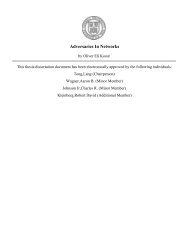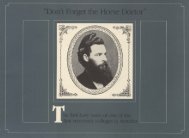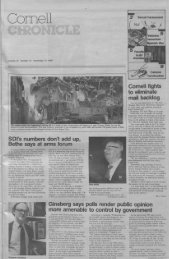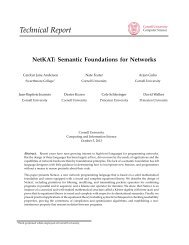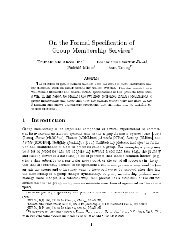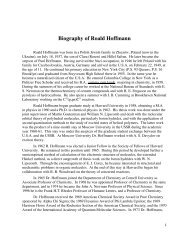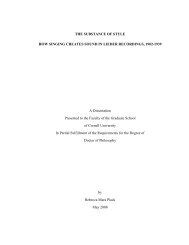Cornell Alumni News - eCommons@Cornell - Cornell University
Cornell Alumni News - eCommons@Cornell - Cornell University
Cornell Alumni News - eCommons@Cornell - Cornell University
Create successful ePaper yourself
Turn your PDF publications into a flip-book with our unique Google optimized e-Paper software.
guaranteed of this involvement, for example, if he majors<br />
in Asian studies, or Classics, or geological sciences, or<br />
history of art.<br />
Q. Is it then a matter of supply and demand?<br />
A. No. There is more to it than that because in the best<br />
of all possible worlds one would not wish a student to distort<br />
his selection of major simply to get small classes. You<br />
would like a student who wants to major in English to be<br />
able to take small classes. Since so many of our students, not<br />
only in Arts and Sciences, but in other colleges, go on to<br />
graduate work or professional schools, the key thing is that<br />
there should be enough upperclass professors who know a<br />
student well enough to recommend him to graduate school.<br />
If a student's experience has been so impersonal that no<br />
professor knows him well enough to recommend him to<br />
graduate school, I think our educational system is breaking<br />
down.<br />
Q. Did the commission study the constant student complaint<br />
that <strong>Cornell</strong> classes are too large and too anonymous?<br />
A. Yes. There is an elementary idea involved here which<br />
is difficult to get across. Let me try. Suppose I am a <strong>Cornell</strong><br />
professor and I ask myself what my experience is and what<br />
the institution looks like to me. It turns out most of my<br />
class time is spent in small classes because most of the<br />
classes at <strong>Cornell</strong> are small. If I have four classes a year,<br />
the chances are that one will be a large freshman or sophomore<br />
class, but the other three will be small upperclass<br />
courses, or seminars, or graduate seminars. So the professors<br />
'. . . we are certain<br />
that the new dormitory<br />
complex will be very<br />
imaginative and a<br />
highly effective way<br />
of creating a total<br />
educational environment.*<br />
and, if we're not very careful, the administration tend to<br />
think of the institution as a place where there are no class<br />
size problems.<br />
But, let's look at it from the student standpoint. A student<br />
taking these same courses looks at it quite differently because<br />
his chance of being in a course with two hundred<br />
students is twenty times as great as being in a course with<br />
only ten students. If you look at the student experience, you<br />
find that the probability of his being in the large courses is<br />
higher than the probability of his being in a small course,<br />
so, from the student's standpoint, it's just the reverse of the<br />
professor's.<br />
The student thinks of the institution, on the average, as a<br />
place where most of the classes are large. It's a little bit<br />
like the traffic situation in New York City. If you think of<br />
the average over the course of the day on FDR Drive, it's<br />
not jammed up. On the other hand, if you are a commuter<br />
going in the morning and out in the afternoon, you are on<br />
the highway when the jam is heaviest. The reason you're<br />
more likely to be there at that time is exactly the reason the<br />
jam is heaviest. The student is more likely to be in a large<br />
course than in a small one and that's where the problem<br />
arises. Now, this is a very elementary idea which people<br />
presumably have known about for years. Nevertheless, it<br />
is rather intricate which may explain to some extent the<br />
difference in thinking of faculty, who tend to think there is<br />
no class size problem, and students, who tend to think<br />
there is.<br />
Q. Is there a definite correlation in the students 9 minds<br />
between large class and inadequate teaching?<br />
A. I suspect it's an individual thing. There are some very<br />
successful large classes in which the lecturer is a so-called<br />
"star" who spends a great deal of time bringing all of his<br />
experience to bear on making a compact, efficient presentation<br />
of material to students which is followed up in small<br />
recitation or laboratory sections.<br />
On the other hand, there are probably courses involving<br />
only the large lecture which, although good, by no means<br />
takes advantage of the entire experience of the professor in<br />
bringing it to bear on undergraduate teaching problems. I<br />
don't know whether the students, as a whole, correlate large<br />
courses with poor teaching. I hope they do not, because I<br />
don't think there is such a correlation. I think the only<br />
question is that of the appropriate mix of large courses and<br />
small courses over the four years during which a typical<br />
student is at <strong>Cornell</strong>. I think there's no danger in a student<br />
being only involved in small courses while he is here. I<br />
think the only warning flags that are flying, to which we have<br />
to pay some attention, are those telling of the danger of the<br />
student being only involved in large courses.<br />
Q. In terms of student assessment of teaching, there were<br />
some suggestions in the Kahn-Bowers report of students<br />
possibly rating teachers. Has anything been done on this?<br />
A. Well, here's a question where the character of the<br />
commission has turned out to be very sensible. There are<br />
some areas of evaluation which are natural faculty areas.<br />
There are some areas which are natural student areas. It's<br />
possible that the administration has no role at all in this.<br />
What the commission did was to divide a very tangled<br />
problem by separating it into two different solution approaches.<br />
One was the creation of the course evaluation<br />
questionnaire, largely the work of Assistant Professor<br />
James B. Maas of Psychology. This questionnaire was used<br />
by many faculty members at the end of the fall semester<br />
for the purpose of getting "feedback" from students to use<br />
in improving the course. The faculty members need not<br />
show the results of the questionnaire to anybody else and,<br />
in general, probably will not. They simply use it to improve<br />
the course the next time they give it.<br />
The second consideration involves information the students<br />
need in order to select courses. In the fall, Student<br />
Government published the preliminary issue of a document<br />
called Index which gave students descriptive evaluations<br />
of some twenty courses. The students intend to look at fall<br />
term courses in order to bring out a new issue of Index,<br />
presumably for pre-registration time in the spring. This<br />
issue will tackle, I hope, a good deal more than twenty<br />
May 1967 23




